Comparing Two 1TB NVMe Drives with Same NAND, Same Controller: XPG SX8200 Pro vs HP EX950
by Billy Tallis on February 6, 2019 11:30 AM ESTAnandTech Storage Bench - Light
Our Light storage test has relatively more sequential accesses and lower queue depths than The Destroyer or the Heavy test, and it's by far the shortest test overall. It's based largely on applications that aren't highly dependent on storage performance, so this is a test more of application launch times and file load times. This test can be seen as the sum of all the little delays in daily usage, but with the idle times trimmed to 25ms it takes less than half an hour to run. Details of the Light test can be found here. As with the ATSB Heavy test, this test is run with the drive both freshly erased and empty, and after filling the drive with sequential writes.
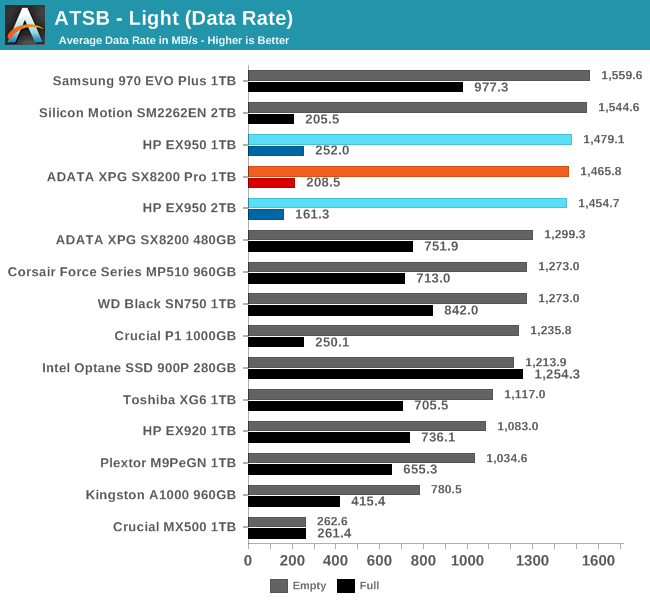
When the Light test is run on an empty drive, the SM2262EN SSDs offer excellent performance, but it's not meaningfully better than what last year's models did with the original SM2262 controller. What's changed is that full-drive performance is much worse, and the gap between empty and full drive performance is much larger for the Light test than for the Heavy test.
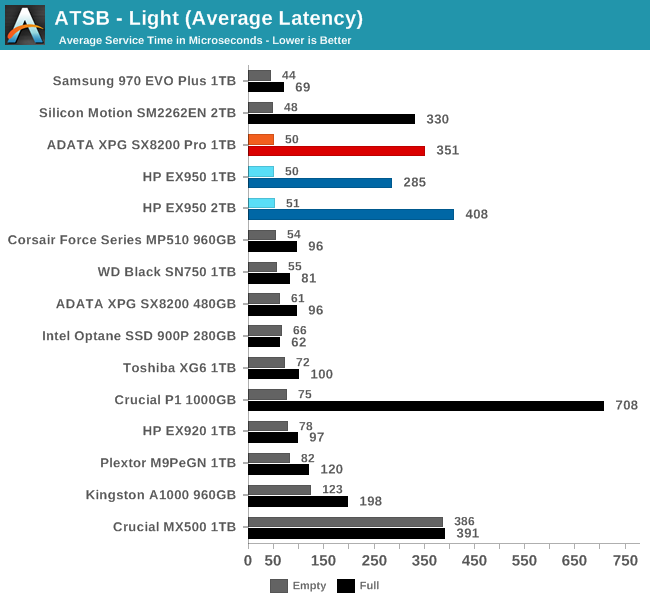
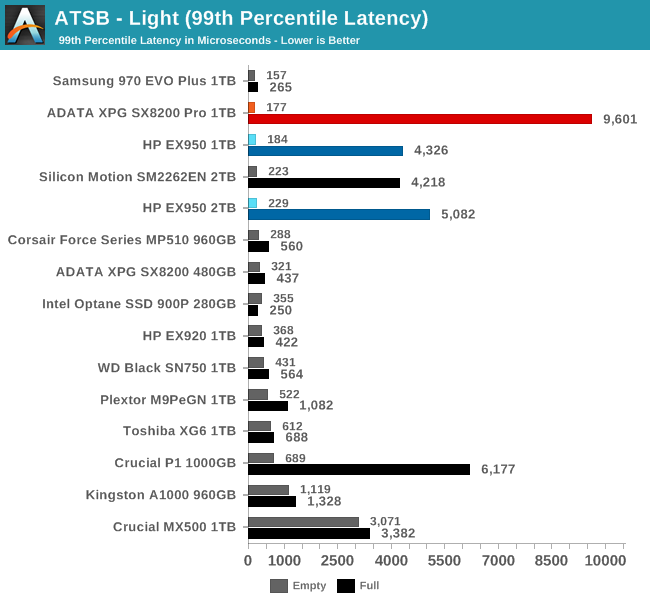
The average and 99th percentile latency scores for the SM2262EN drives are barely slower than the Samsung 970 EVO Plus when the Light test is run on an empty drive, but the full-drive average latency is about as bad as a mainstream SATA drive, and the 99th percentile latencies are worse.
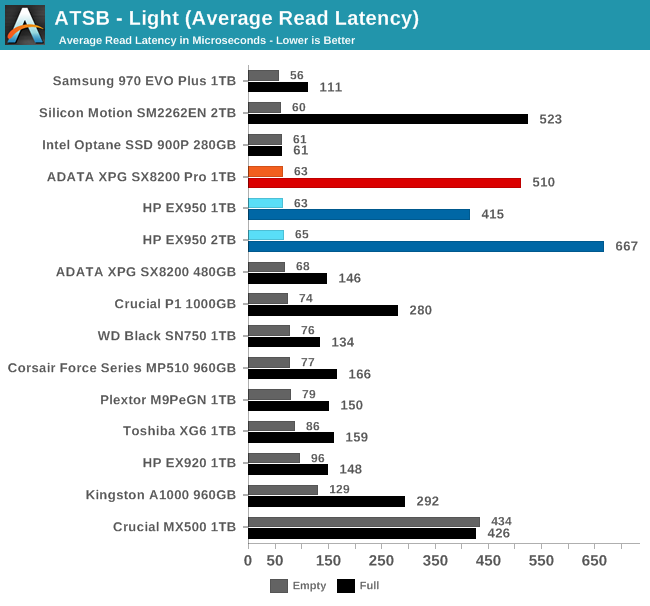
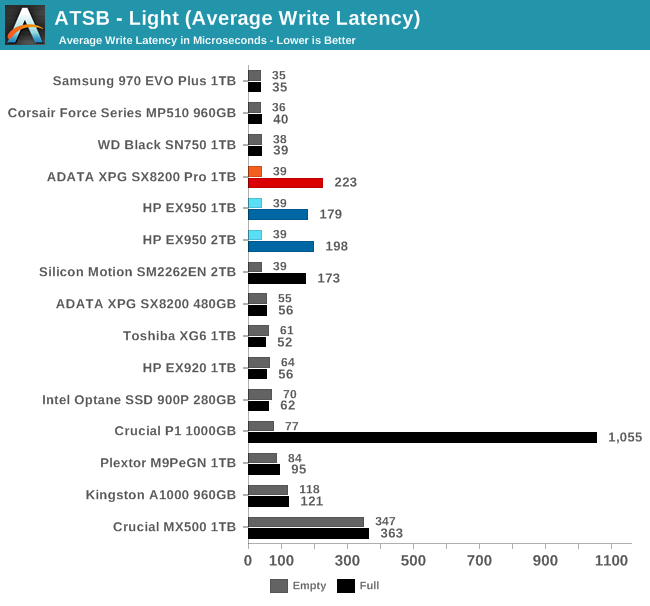
The average read and write latency scores for the SM2262EN drives are within a few microseconds of the fastest drives when the Light test is run on an empty drive, but when the drives are full the read latency ends up in SATA territory and the write latency comes close to that.
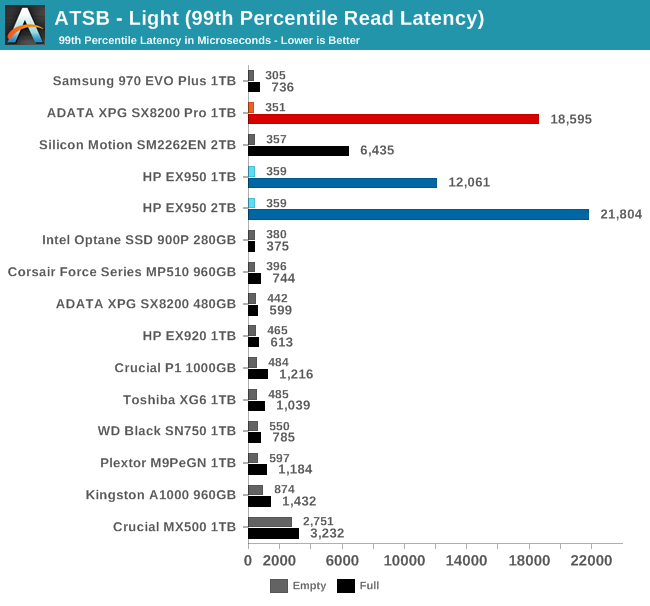
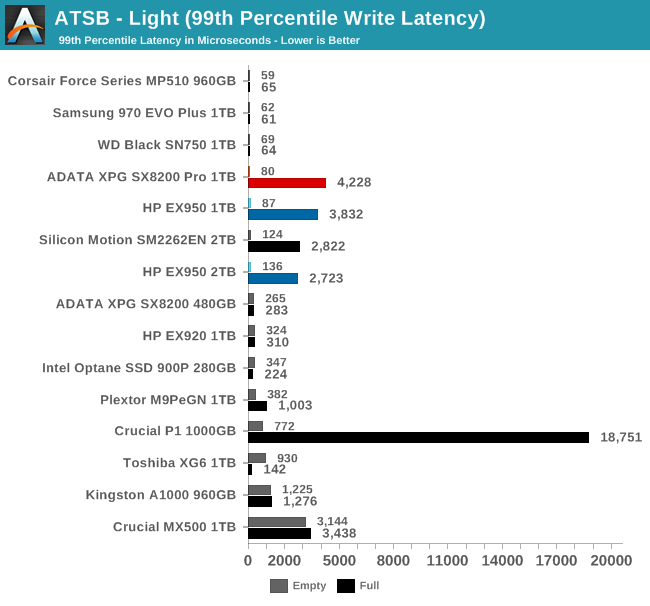
The 99th percentile read and write latency scores again show no problem for the SM2262EN drives when the Light test is run on an empty drive, but the full-drive performance is a problem. In this case, the 99th percentile read latency is especially bad, with the retail SM2262EN drives scoring worse than the engineering sample and providing tail latencies several times higher than the Crucial MX500 SATA drive.
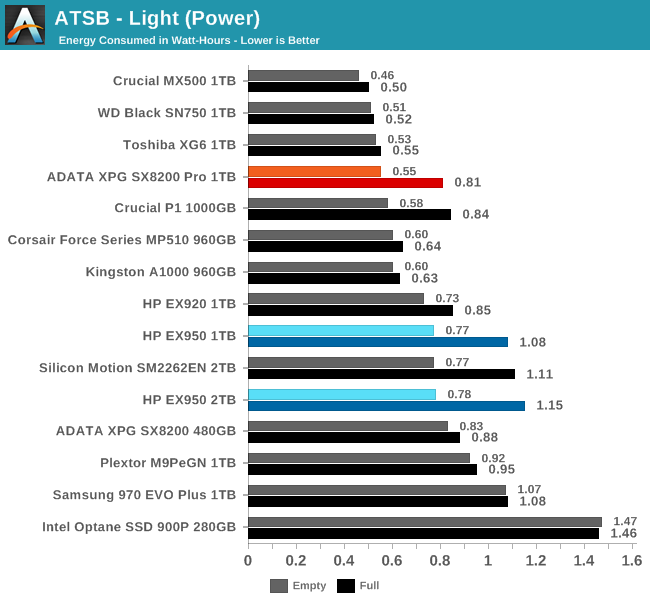
The SM2262EN drives again show significantly higher energy requirements when the test is run on a full drive rather than an empty drive. The ADATA SXP SX8200 Pro's efficiency advantage over the HP EX950 means the former's efficiency is still decent by NVMe standards even for the full-drive test run.










42 Comments
View All Comments
mapesdhs - Thursday, February 7, 2019 - link
I can't help wondering how some of the old favourites would behave in these comparisons, the 950 EVO/Pro, 960s, etc. Have things really moved on that much?Billy Tallis - Thursday, February 7, 2019 - link
We have at least partial test results in Bench for most of the old drives that aren't worth including in every review: https://www.anandtech.com/bench/product/2219?vs=23...eddieobscurant - Thursday, February 7, 2019 - link
It's not about crystal disk mark score. It's about almost no one of the everyday user, playing games, surfing the web and using microsoft office, will come near your "light" test, let alone "heavy" or "torture".Most of them need high random reads for their computer to feel snappy and responsive, and a big enough a slc cache to accommodate a full bluray of writes.
Billy Tallis - Thursday, February 7, 2019 - link
"Most of them need high random reads for their computer to feel snappy and responsive,"They already have that. Further increases to random read performance won't make the system feel any more responsive during light workloads, as demonstrated by SYSmark. High-end NVMe SSDs are already way past the point of diminishing returns for peak random read speeds, especially for lighter workloads where a few GB of DRAM used by the OS for caching is enough to almost completely decouple storage performance from application responsiveness.
eddieobscurant - Friday, February 8, 2019 - link
So, you're saying that optane doesn't feel more responsive to you, or that the high random reads of optane isn't responsible for feeling more responsive than a high end nvme ssd ?Dark_wizzie - Wednesday, February 6, 2019 - link
Why does perf drop on 2tb model?Dark_wizzie - Thursday, February 7, 2019 - link
For low qd random reads, sorry.Dark_wizzie - Thursday, February 7, 2019 - link
And... serves me right for commenting before finishing the last page of the article. >.>oh well.
GreenReaper - Thursday, February 7, 2019 - link
Grabbed an MX500 500GB at Christmas. It's half the price of those tested here, and uses up a spare SATA. Hardly the fastest SSD in the world, but for most purposes it's hard to tell the difference.mapesdhs - Thursday, February 7, 2019 - link
They do seem to be well priced, though I bagged several barely used 850 Pro 512GB units for about the same cost, people seem to be selling them for silly money these days, grud knows why. The 840 Pro is also still very good, one of the most reliable SATA SSDs ever made.